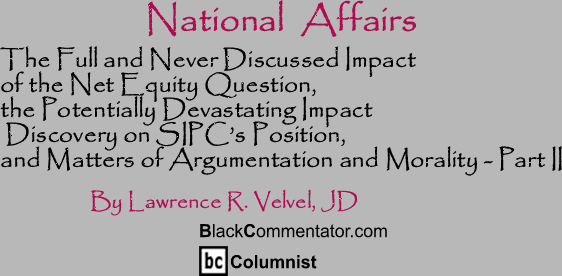
|
||||||||||||||||||||||||

|
|

Custom Search
|
|
 |
|
If readers remember not one other thing of what is written in this four-part commentary, I urge them to remember - and therefore am repeating yet again - the possibility that Picard’s definition of net equity may deprive them not just of $500,000, but also of any share in the estate. This possibility should be cleared up, one way or the other, as quickly as possible. There are also some matters of lesser practical import that I would like to discuss here. One is related to the three percent question.
Early on, Picard told a lawyer that, if the latter wants insight into what Picard will do in the Madoff case, he should read what was done in the (relatively recent) Park South case. Well, I’ve now read a couple of Picard’s reports to the court in Park South. And while I plainly confess to being unable to understand parts of the reports, it at least seems to me likely - almost a certainty - that Picard was paid a lot more than three percent of what he collected and distributed in that case. He was paid on an hourly basis, at a ten percent discount from his normal fees, and ultimately seems pretty clearly to have requested $1,046,557, plus up to a possible additional $50,000, in fees for his personal work. (The fees for his personal work went to his law firm, as did even larger amounts of fees (I think $2,654,714) for work done by others in his law firm.) The amounts he collected and distributed appear to me to be either $7,410,969 or that amount plus $1,414,149 and/or $817,5434. But, frankly, I am not sure I understand all relevant aspects of this side of the equation - relevant to the question of how much he collected and distributed. (For example, I do not necessarily grasp the relevance, if any, of enabling a release of frozen accounts.)
Not to be misunderstood, I am not saying that Picard did not earn or did not deserve what he was paid. I am saying only that it seems certain he received far more than three percent of what he collected and distributed. And if it is common for brokerage assets not to be extensive in SIPC proceedings, so that relatively little can usually be recovered and distributed, it might be thought necessary to pay trustees more than three percent in order to get good work, and the three percent limitation of the bankruptcy code would therefore be claimed to be inconsistent with and non applicable to SIPC proceedings. Of course, if the argument that three percent is inadequate to get good work by a SIPC trustee were true, how is it that three percent is apparently sufficient to get good work by trustees in non-SIPC bankruptcies? The last question highlights what I think may be a characteristic of SIPC. While I am truly a newbie with regard to everything SIPC, I am getting the notion that, if a Bankruptcy Code provision is not something SIPC likes, SIPC claims the provision is inconsistent with SIPA. A claimed inadequacy of three percent “commission” in SIPC cases involving brokers, despite three percent being satisfactory for non-brokerage bankruptcies, could exemplify. Another example might be SIPC’s recent argument when a party moved early this year for a court order allowing it to sue (the Trustee, I gather) within 30 days after the Trustee wins, for example, a preference claim against that party subsequent to last July 2nd.
The moving party asked the Bankruptcy Court Judge, Burton Lifland, for a judicial order under which the springing claim would not have to be brought by July 2, when it did not yet exist, but only within 30 days of the Trustee’s subsequent victory which brings it into existence. One asks: how could this request be denied? If it were denied, the moving party will never be able to bring his springing claim, since he has no claim before the Trustee beats him in litigation after July 2nd that creates the “springing” claim. But after he is beaten, he cannot bring the springing claim since it will be barred because it was not filed by July 2nd. But SIPC and Picard both said the request for an order giving 30 days after Picard’s victory to bring a springing claim should be denied because the SIPA provision under which the springing claim is barred is inconsistent with the Bankruptcy Code provision allowing the springing claim to be brought. SIPC and Picard did say that it is not necessary to decide the question now, since at present the problem can be elided by the filing of a so-called “protective” claim by the moving party: i.e., by the moving party filing what in effect could be called a reservation of the right to bring a “springing claim” if one arises later due to a Picard victory after July 2nd in, say, a preference suit. But, when such a claim is brought, judging by what their briefs say, it is sure-fire that Picard and SIPC will argue that it can’t be brought because it was brought after July 2nd and is therefore too late because it is inconsistent with SIPA. It is sure-fire that they will claim the springing claim was barred before it even arose because the Bankruptcy Code is inconsistent with SIPA and SIPA controls. By the way, Judge Lifland seemed to mainly adopt the view of Picard and SIPC. He said the question of inconsistency is a serious one - can you believe that in view of their heads they win, tails you lose position? - and that he was going to postpone a decision since the moving party could file a protective claim. In any event, this all shows how far SIPC and Picard will go in claiming inconsistency when such a claim accords with what they want. Picard’s office seems to also have made another argument that was beyond the pale. Helen Chaitman filed what could be called - tactfully - a vigorously-worded complaint seeking, among other things, a judicial decision that one’s net equity is based on the November 30th statement, not on the cash in/cash out basis. Similar requests for decision have been filed by Brian Neville and Jonathan Landers. All the papers are, frankly, pretty good, though Neville’s strikes me as the most complete because he has by far the most citations to and quoted material from the legislative history of SIPA and from prior positions explicitly stated by or followed by SIPC and its officials such as Harbeck and Wang. (Harbeck told a court that people would get the value of securities their statements showed them as owning even if the securities were not there or had never been bought.) The historical material - the legislative history and prior SIPC positions - cited or quoted by Neville makes a simply overwhelming case. And while there are reasons I do not wish to predict that Judge Lifland will rule in our favor even though Neville’s position is overwhelming, it is hard to deny the enormous power of what Neville has written. I shall return to this in a bit.
Now, as is known by some people
who were on the Steering Committee, I hold no brief for Helen Chaitman,
since she attacked me in writing and orally. But she has been of
great service to victims of Madoff, especially in resisting illegitimate
SIPCian/Picardian positions, and it was simply beyond the pale for
Sheehan to argue that she should not represent persons with net
equity problems because, since she herself does not have them, she
might not fully and competently represent those who do. Chaitman
had long made clear (and did so yet again in response to Sheehan)
that, though she herself has no net equity or clawback problems,
she believes that SIPC’s cash in/cash out method and threats to
claw back from the innocent (and the often destitute) are immoral.
Not just illegal; immoral. The community of victims has long had
access to her views, and has been told - I think (but am not sure)
that she may even have required clients to sign waivers acknowledging
- that even if Picard’s net equity position and threatened clawbacks
from the innocent would redound to the signer’s personal benefit,
she is going to argue against such actions - as a matter of moral
belief, no less. That position is an abomination. It is not, shall we say, made better by the suspicion, which will not down, that the Trustee’s office is taking that position and others because of a desire to, if possible, get rid of a lawyer who has been a real bone in their throat because of her powerful, even if sometimes (deservedly) vituperative representation of clients - clients whose “newfound” destitution and continuous victimization - this time by SIPC - puts them in need of an advocate who will express things powerfully and colorfully (though there are very competent and thorough lawyers who think such mode of expression harmful rather than helpful. My own personal view is that it doesn’t hurt for one person to pull no punches when others are being more circumspect, i.e., there is a need for both styles.) But, back to the question of arguing that Chaitman supposedly cannot represent people with problems that she does not have, although she regards what is being done to them as immoral. When one considers the argument beyond the confines of this case, its implications are shocking. Are criminal lawyers who think charges against their clients unjustified, frivolous, or so much the product of prosecutorial misconduct as to be immoral, to be barred from representing the clients because the lawyers are not in the same position as the clients - are not themselves charged with crime? Should Darrow not have been allowed to defend Leopold and Loeb because Darrow didn’t kill anyone? You know, whether a lawyer may choose not to represent someone because of a moral disagreement with the person’s position is one thing, and many is the commercial lawyer who for the money chooses to represent positions he or she may disagree with. But whether a lawyer must be barred from representing a position he or she agrees with, barred from this because he/she does not share the same circumstances, is quite a different thing, and Sheehan’s paper crosses a line here. [Please note: during the month of August, BlackCommentator.com will be presenting a special series, The Best of BC. Click here to read parts III and IV of Dean Velvel’s commentary.] BlackCommentator.com
Columnist, |
|
Any BlackCommentator.com article may be re-printed so long as it is re-printed in its entirety and full credit given to the author and www.BlackCommentator.com. If the re-print is on the Internet we additionally request a link back to the original piece on our Website. Your comments are always welcome. eMail re-print notice
If you send us an eMail message we may publish all or part of it, unless you tell us it is not for publication. You may also request that we withhold your name. Thank you very much for your readership. |
|
| |
|
| July
30, 2009 Issue 335 |
|
| Executive Editor: Bill Fletcher, Jr. |
| Managing Editor: Nancy Littlefield |
| Publisher: Peter Gamble |
| Est. April 5, 2002 |
Printer Friendly Version
in resizeable plain
text format or pdf
format. |
| Frequently Asked Questions |
 |

|
 |
 |
 |
| |
| |






























 In
any event, for Picard’s total fees of (I think) $1,046,557, plus
another possible $50,000, to have been no more than three percent
of what he collected and distributed, the latter figure would have
to be in excess of $35 million. Despite the shortcomings of my own
comprehension, I think it is pretty clear he did not collect and
distribute anywhere near that amount. If I am wrong about this,
then, once again, I would appreciate it if Harbeck and Picard would
correct my mistake and explain what the correct facts are.
In
any event, for Picard’s total fees of (I think) $1,046,557, plus
another possible $50,000, to have been no more than three percent
of what he collected and distributed, the latter figure would have
to be in excess of $35 million. Despite the shortcomings of my own
comprehension, I think it is pretty clear he did not collect and
distribute anywhere near that amount. If I am wrong about this,
then, once again, I would appreciate it if Harbeck and Picard would
correct my mistake and explain what the correct facts are. Apparently,
such a victory by the Trustee could possibly itself give rise to
some type of countering claim, called a springing claim (as in “it
springs up”). If the Trustee’s victory came after July 2nd, the
countering claim would be barred under SIPC law because July 2d
was the last permissible day for a Madoff victim to file a claim.
But the suit for a “springing claim” would not be barred under the
Bankruptcy Code.
Apparently,
such a victory by the Trustee could possibly itself give rise to
some type of countering claim, called a springing claim (as in “it
springs up”). If the Trustee’s victory came after July 2nd, the
countering claim would be barred under SIPC law because July 2d
was the last permissible day for a Madoff victim to file a claim.
But the suit for a “springing claim” would not be barred under the
Bankruptcy Code.
 More
to the point immediately is that Picard - or more accurately one
of his lawyers, David Sheehan - responded in kind - more than in
kind - to Chaitman’s papers. He far out-vituperated the vituperative.
He claimed Chaitman and her law firm were acting unethically, tried
to threaten them with sanctions, attempted to force them to withdraw
the papers, and, worst of all in my opinion, claimed that Chaitman
could not represent persons who have net equity problems under the
Picard/SIPC cash in/cash out method because Chaitman herself has
no such problems. (He also accused her of acting improperly by representing
both persons who have such problems and persons who don’t.) Sheehan
also claimed that, because Chaitman herself has no net equity problem,
she might not fully and completely represent those who do.
More
to the point immediately is that Picard - or more accurately one
of his lawyers, David Sheehan - responded in kind - more than in
kind - to Chaitman’s papers. He far out-vituperated the vituperative.
He claimed Chaitman and her law firm were acting unethically, tried
to threaten them with sanctions, attempted to force them to withdraw
the papers, and, worst of all in my opinion, claimed that Chaitman
could not represent persons who have net equity problems under the
Picard/SIPC cash in/cash out method because Chaitman herself has
no such problems. (He also accused her of acting improperly by representing
both persons who have such problems and persons who don’t.) Sheehan
also claimed that, because Chaitman herself has no net equity problem,
she might not fully and completely represent those who do. Nobody,
as far as I know, can legitimately argue that they did not know
where she stood, and became her clients in ignorance of her intent.
For Sheehan to argue that her own personal financial position vis
a vis Madoff - i.e., the fact that she has no net equity or clawback
problem - prevents her from representing those who do, is for Sheehan
to argue that a lawyer in practice cannot take a moral position
that he or she believes in if it does not also accord with his/her
personal circumstances.
Nobody,
as far as I know, can legitimately argue that they did not know
where she stood, and became her clients in ignorance of her intent.
For Sheehan to argue that her own personal financial position vis
a vis Madoff - i.e., the fact that she has no net equity or clawback
problem - prevents her from representing those who do, is for Sheehan
to argue that a lawyer in practice cannot take a moral position
that he or she believes in if it does not also accord with his/her
personal circumstances.






